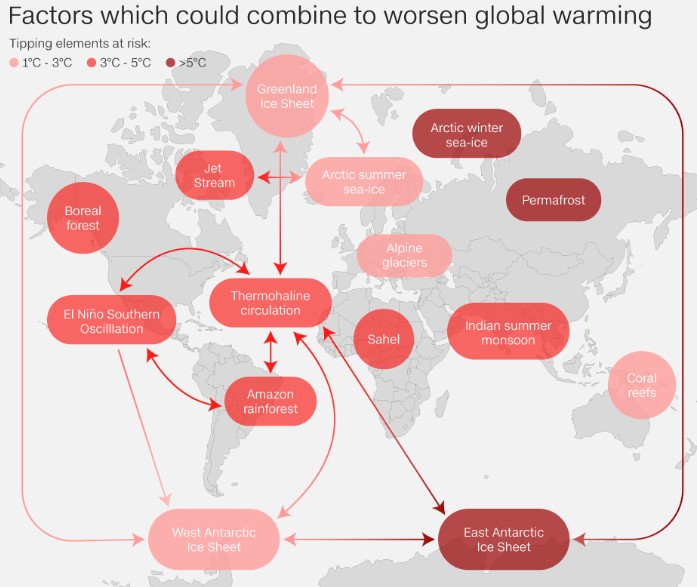
Scientists are warning that a domino effect will kick if global temperatures rise more than 2°C above pre-industrial levels, leading to “hothouse” conditions and higher sea levels, making some areas on Earth uninhabitable.
The report, “Trajectories of the Earth System in the Anthropocene,” published Monday in the American Proceedings of the National Academy of Sciences, said “hothouse” temperatures could stabilize 4°C to 5°C (39 to 41 Fahrenheit) higher than pre-industrial levels.
“Human emissions of greenhouse gas are not the sole determinant of temperature on Earth. Our study suggests that human-induced global warming of 2°C may trigger other Earth system processes, often called ‘feedbacks,’ that can drive further warming — even if we stop emitting greenhouse gases,” lead author Will Steffen of the Australian National University said.
Key interactions
The report highlights the consequences of how the interactions between a variety of climate change factors, such as the loss or weakening of carbon sinks, forest dieback, ice retreat and increased bacteria respiration, could combine to form a feedback loop which accelerates climate change.
“These tipping elements can potentially act like a row of dominoes,” said Johan Rockstrom, co-director of the Potsdam Institute for Climate Impact Research and another of co-author of the report.
“Once one is pushed over, it pushes Earth towards another. It may be very difficult or impossible to stop the whole row of dominoes from tumbling over. Places on Earth will become uninhabitable if ‘Hothouse Earth’ becomes the reality.”
Raging fires, heatwaves
The report comes as much of the northern hemisphere struggles with deadly heatwaves and raging wildfires, which most scientists attribute to man-made climate change.
Richardson says that while the current weather can’t in isolation be used as proof of the effects of climate change, the summer’s extreme heat means that people may be more receptive to the urgency of the situation.
“People getting a taste of the heatwaves, this is what climate change is all about,” she said.
“What this is all about is humanity is recognizing the fact that we need to manage our resources at a global level… When we can see that we can impact the climate, then it becomes part of our responsibility to maintain the earth system.”
To reverse this potential domino effect, climate change needs to be combated on all fronts, the report says, with “collective human action” is required to steer us away from this potential threshold, including “decarbonization of the global economy, enhancement of biosphere carbon sinks, behavioral changes, technological innovations, new governance arrangements, and transformed social values.”
Richardson said that rather than considering the report a “doomsday prophet,” it should give hope that if action is taken now, the world can avert the most dire predictions.
“I think this paper has a positive message. If we understand this system and how it works, then we have the power to go in and trick the system.
“Knowledge is power — the more we know the more possibilities to manage it to our positive outcome (we have,)” she said.

